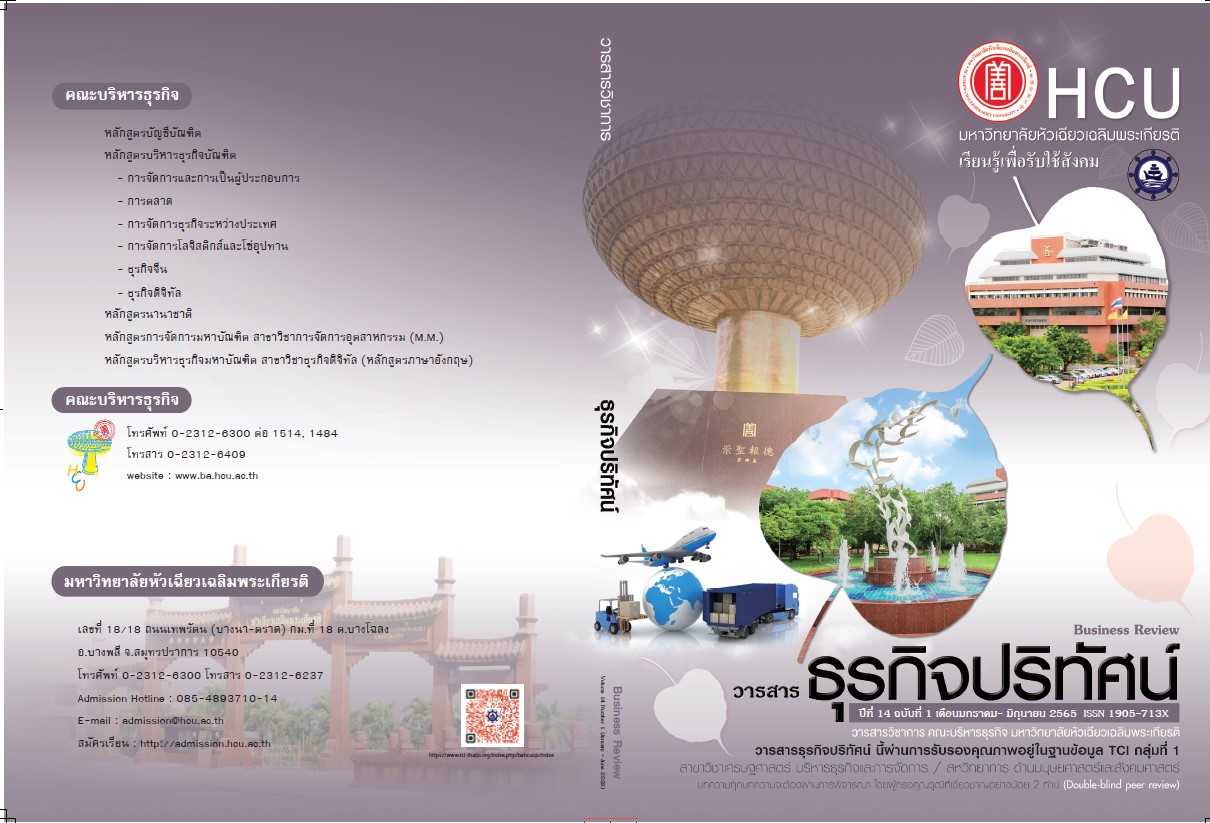Organizational Creativity Management Affecting the Innovative Model in the Real Estate Business
Keywords:
Creativity Management , Innovation, Real Estate BusinessAbstract
The purposes of this research were to study the 1) organizational creativity management, 2) success of innovation in estate business. This study using quantitative method to gather through questionnaires by 400 samples of the worker in the real estate business. Data were analyzed by descriptive and inferential statistics.
The results showed that most of the respondents were males, aged 25 – 35 years, bachelor’s degree and an average monthly income of 20,000 – 30,000 Bath, worked in the building department for 4 – 6 years and paid attention to the importance of the innovation management in terms of the individual creativity and innovation in the highest level. Furthermore, the relationship among factors, including the personnel’s creativity, tasks that promote creativity, and the executives’ support in creativity related to the success in the innovation operation of the organization. In order to create the innovation that suited the Thai context well, the study suggested that ones should truly understand the present situations and trends in the real estate business to be able to propose an appropriate plan for the innovation operation for the organization. In addition, the organization should implement the policy that would promote creativity in all levels of personnel through various activities.
References
กรมพัฒนาธุรกิจการค้า. (2561). ธุรกิจอสังหาริมทรัพย์. กรมพัฒนาธุรกิจการค้า กระทรวงพาณิชย์. https://www.dbd.go.th/news_view.php?nid=469413374.
อสังหาฯ เปิดแนวรุก เมืองผู้สูงวัย (2560, 14 มิถุนายน). กรุงเทพธุรกิจ ออนไลน์.https://www.bangkokbiznews.com/business/759401.
คณะกรรมการพัฒนาขีดความสามารถในการแข่งขันของประเทศ (2562). การสำรวจการจัดอันดับขีดความสามารถในการแข่งขัน. สำนักงานสภาพัฒนาการเศรษฐกิจและสังคมแห่งชาติ. https://www.nesdc.go.th/ewt_news.php?nid=6700&filename=index.
ทศพร บุญวัชราภัย. (2558). ความคิดสร้างสรรค์ขององค์การเพื่อสร้าง นวัตกรรมการบริการและผลการดำเนินงานของธุรกิจ : ปรากฎการณ์เชิงประจักษ์ของโรงแรมบูติกไทย. [ปริญญาปรัชญาดุษฎีบัณฑิต สาขาวิชาการจัดการ]. มหาวิทยาลัยศิลปากร.
บุญใจ ศรีสถิตนรากูล. (2553). ระเบียบวิธีวิจัยทางพยาบาลศาสตร์. กรุงเทพฯ : ยูแอนด์ไอ อินเตอร์ มีเดีย.
พยัต วุฒิรงค์. (2557). กรอบแนวคิดการพัฒนาความสามารถในการสร้างสรรค์นวัตกรรมองค์การ : การบูรณาการแนวคิดทรัพยากรที่มีคุณค่าเฉพาะขององค์การและองค์การแห่งการแห่งการเรียนรู้. วารสารพัฒนบริหารศาสตร์, 54(1), 21-48.
ยุทธชัย ฮารีบิน สมนึก เอื้อจิระพงษ์พันธ์ และ สุนันทา เสียงไทย. (2559). ความสามารถด้านเครือข่ายและความสามารถเชิงนวัตกรรมของวิสาหกิจขนาดกลางและขนาดย่อม. วารสารนักบริหาร, 36(2), 79-88.
สิริภักตร์ ศิริโท รัตติญา ละเต็บซัน และ วิวัฒน์ กิตติพงศ์โกศล. (2560). ความเป็นองค์กรนวัตกรรมของสถาบันอุดมศึกษาในประเทศไทย. วารสารบริหารธุรกิจเทคโนโลยีมหานคร, 14(1), 38-64.
Christiansen, J.A. (2000). Building the innovative organization: Management systems that encourage innovation. Hampshire: Macmillan Press.
George, M.L, Works, J., & Waston-Hemphill, K. (2005). Fast Innovation. NY: McGraw-Hill.
Higgins, J.M. (1995). Innovate or evaporate: Test & improve your organization’s IQ–Its innovation quotient. Winter Park, FL: New Management.
Holder, B. & Matter, G. (2014). The Innovative Organization. Retrieved December 11, 2014, from Geocities.com. http://www.geocities.com/CollegePark/Library/1048/innova.html.
Piteira, M. (2013, November 28-30). Professions in a changing world: The role of creativity. In H. Serra (Chairs), Challenging professionalism. New directions in policies, publics and the professions [Symposium]. ISA RC52 Interim Conference, Technical University of Lisbon, Protugal.
Seidel, S. & Rosemann, M. (2008). Creativity Management - The New Challenge for BPM. Retrieved February 2, 2020, from BPTrende-May 2008. https://www.bptrends.com/bpt/wp-content/publicationfiles/Three%2005-08-ART-CreativityManagement-Seidel-and-Rosemann-final.pdf
Shalley, C.E., Zhou, J. & Oldham, G.R. (2004). The effects of personal and contextual characteristics on creativity: Where should we go from here?. Journal of Management, 30(6), 933-958.
Unsworth, K. (2001). Unpacking creativity. Academy of Management Review, 26(2). pp. 289-297.
West, M.A. & Richter, A.W. (2009). Climates and cultures for innovation and creativity at work: In Handbook of Organizational Creativity. NewYork : Psychology Press.
Downloads
Published
How to Cite
Issue
Section
License
Copyright (c) 2022 Business Review Journal

This work is licensed under a Creative Commons Attribution-NonCommercial-NoDerivatives 4.0 International License.
All articles published in the Business Administration and Management Journal Review are copyrighted by the journal.
The views and opinions expressed in each article are solely those of the individual authors and do not represent those of Huachiew Chalermprakiet University or any other faculty members. Each author is fully responsible for the content of their own article. Any errors or issues found are the sole responsibility of the respective author.




